8°3′46.63″S 34°54′10.73″W / 8.0629528°S 34.9029806°W
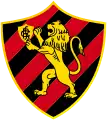 | ||||
| Full name | Sport Club do Recife | |||
|---|---|---|---|---|
| Nickname(s) | Leão (Lions) Leão do Norte (Lions of the North) Leão da Ilha (Lions of the Island) Maior do Nordeste (Best in the Northeast) | |||
| Founded | 13 May 1905 (as Sport Club do Recife) | |||
| Ground | Ilha do Retiro | |||
| Capacity | 32,983 | |||
| President | Yuri Romão | |||
| Head coach | Mariano Soso | |||
| League | Campeonato Brasileiro Série B Campeonato Pernambucano | |||
| 2023 2023 | Série B, 7th of 20 Pernambucano, 1st of 13 (champions) | |||
| Website | Club website | |||
|
| ||||
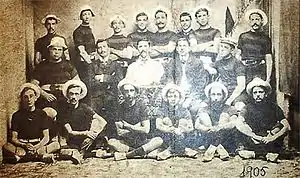
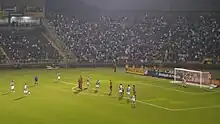
Sport Club do Recife (Portuguese pronunciation: [ˈspɔʁtʃi ˈklub du ʁeˈsifi]), known as Sport Recife or Sport, is a Brazilian sports club, located in the city of Recife, in the Brazilian state of Pernambuco. Founded in 1905, the club currently plays in Série B. In football, the club has won six CBD/CBF titles, including three national and three regional. Its greatest achievements are winning the 1987 Brazilian Championship and 2008 Copa do Brasil. In addition to professional football, the club also participates in women's football and Olympic sports, such as rowing, swimming, hockey, basketball, futsal, volleyball, table tennis, taekwondo, judo and athletics.
Their historical rival is Náutico, and they both dispute the Clássico dos Clássicos. The derby against Santa Cruz is called the Clássico das Multidões, while the derby with América is called the Clássico dos Campeões.
History
Foundation and early years
Sport Club do Recife was founded on 13 May 1905 by Guilherme de Aquino Fonseca, a member of a wealthy family in Pernambuco who found a love for football while studying engineering at the University of Cambridge in England. The club were the first recorded football club in the state of Pernambuco. Sport played their first match on 22 June 1905, drawing 2–2 against a team called English Eleven, a team formed by employees working for English companies in Recife.
The Campeonato Pernambucano was established in 1916, and Sport won the competition's first two titles. From 1923 to 1925, Sport won the competition three consecutive times, and became tricampeão (three time champion).
International tours and military government years
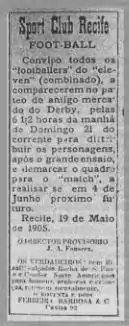
Sport Recife celebrated their 50th anniversary in 1955 by winning their 15th state title. In 1957, the club toured Europe. A total of 17 matches were played, with 6 wins, 3 draws, and 8 defeats. These matches include the 5–3 loss against Real Madrid, which was the first night game at Santiago Bernabéu Stadium.[1]
Sport Recife participated in the 1963 International Soccer League, finishing fourth in their group, with 2 wins, 2 draws, and 2 defeats.[2]
As a result of a dispute with the Federação Pernambucana de Futebol (FPF), Sport did not participate in the 1978 Campeonato Pernambucano.
First National league title
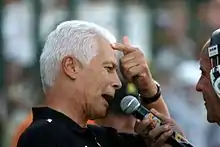
The 1987 Campeonato Brasileiro/Copa União resulted in Sport's first national title, conquered in common justice. However, the club did not officially receive this title until 30 years later, in 2017.[3] This was due to a dispute with Flamengo, who also claimed to have won the title, since the latter, champion of the 1987 championship, as well as Internacional, refused to compete in a quadrangular crossing with the finalist teams of Module B, in the case of Sport and Guarani.[4] After topping group B in both the 1st and 2nd rounds Sport beat Bangu 5–4 on aggregate in the semi-final, and then Guarani 3–2 in the final. By winning the title, they qualified for the 1988 Copa Libertadores, but failed to qualify for the next stages of the competition, finishing third in their group, although with a notable 5–0 victory over Alianza Lima.
A terrible 1989 league campaign resulted in the club's relegation. However, they won the 1990 Série B, with a 1–1 draw on aggregate against Atlético Paranaense in the final, but were awarded the title due to their better record across the season. Led by Givanildo Oliveira, Sport won the 1st edition of the Copa do Nordeste in 1994, beating hosts CRB on penalties after a 0–0 draw in normal time.
21st century
In 2000, Sport won the Copa do Nordeste for the 2nd time, this time under the command of coach Celso Roth after a 2–2 draw against Vitória, again winning the title due to a superior record. In the next Copa do Nordeste edition, Sport finished as runner up, losing 3–1 to Bahia.
In 2006 Sport were promoted to the 2007 Serie A by finishing second in the league table, after five years in Série B.
Sport became the first club from Northeastern Brazil to win the Copa do Brasil, beating Corinthians on away goals in the 2008 final. By winning the cup, Sport contested its second Copa Libertadores in 2009, and had a great start, finishing first of a group containing LDU, Colo-Colo and Palmeiras. They were drawn against Palmeiras in the next round, but were defeated on penalties, after drawing 1–1 on aggregate. In the second half of 2009, Sport disputed the Brasileirão, but could not repeat the excellent first half of the year, and finished in last place with a 4–0 defeat to Sao Paulo on the last matchday, being relegated to Série B with four managers throughout the season.
O Leão da Ilha returned to Série A for the 2012 season, going through three managers - Helio dos Anjos, Mazola Júnior, and Paulo Gusmão, as they were relegated again with a seventeenth placed finish. Although they were in Serie B, Sport inherited a spot in the 2013 Copa Sudamericana by regulation of CBF towards the remnants of the Copa do Brasil. Leão were eliminated by Libertad of Paraguay with two losses in the 2nd phase, after eliminating Náutico.
2014 was a great year for Sport: they returned to Serie A, won their third Copa do Nordeste, 40th Campeonato Pernambucano, and finished 11th in the league, which ensured them a place in the Copa Sudamericana. Sport entered the 2015 Copa Sudamericana in the second stage, where they beat Bahia 4–2 on aggregate with an incredible comeback,[5] as Bahia had won the first leg 1–0.[6] In the next stage, they faced Argentine club Club Atlético Huracán. In the first leg played in Brazil, the match ended in a 1–1 draw. However the second leg in Buenos Aires ended in a 3–0 defeat, resulting in the club's elimination from the competition.
Vigor Gang
In 2021, Sport had an illustrious fan who became known nationally for participating in the TV show (Big Brother Brasil), Gil do Vigor. With his charisma and debauched way, he also showed the country his affection for the club of his heart: Sport. He was honored by the Club, and recognized as a symbol fan of the team and of Gay Pride. Today Sport Recife is also remembered as the "Turminha do Vigor", a team with a vision of the future, without prejudices that embraced its origin and history.
Honours
National
Regional
- 1994, 2000, 2014
- 1968
State
- 1998, 2003, 2007
Current squad
First team
- As of 15 January 2024[7]
Note: Flags indicate national team as defined under FIFA eligibility rules. Players may hold more than one non-FIFA nationality.
|
|
Out on loan
Note: Flags indicate national team as defined under FIFA eligibility rules. Players may hold more than one non-FIFA nationality.
|
|
Technical staff
Current technical staff
|
Top scorers
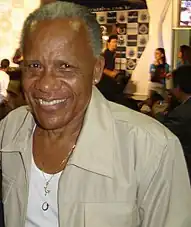
Rank |
Player |
Goals |
| 1º | Traçaia | 202 |
|---|---|---|
| 2º | Djalma Freitas | 161 |
| 3º | Leonardo | 133 |
| 4º | Luís Carlos | 108 |
| 5º | Naninho | 105 |
| 6º | Dadá Maravilha | 94 |
| 7º | Marcílio de Aguiar | 93 |
| 8º | Raúl Bentancor | 91 |
| 9º | Roberto Coração de Leão | 89 |
| 10º | Bé | 80 |
Supporters
In 2013, a study named Sport Recife as the 13th most supported club in Brazil, with around 2.4 million supporters countrywide.[9] The supporters of Sport are called Crimson-black, Leonine and Sportista.
The club has various organized supporter groups:
|
|
Rivalries
Santa Cruz
The Derby of Crowds (Clássico das Multidões) is a duel that often leads many people to Pernambuco. Sport has a considerable advantage in relation to its archrival, with a number exceeding a 60 win differential. It is the second largest difference in rivalry matches of Brazilian football.
Náutico
The Derby of Derbies (Clássico dos Clássicos) is the third oldest derby in the country, second only to Clássico Vovô and Grenal. This brings together the two oldest teams in Pernambuco, with Sport also having a big difference of advantages over its archrival: more than 20 wins.[10]
América-PE
The Champions Derby (Clássico dos Campeões) is one of the most ancient and classical derbies of Pernambuco, and is named that way because until the late 1930s, Sport and its archrival America were together the two teams with the highest number of titles, and were also the two main clubs of Recife. The derby lost popularity after the decline of América-PE, since they haven't won any trophies since the 1940s. América are currently at the second division of the Campeonato Pernambucano.
Esporte Clube Bahia
The rivalry between both clubs is one of the most important regional rivalries of Brazil. Both are the most successful clubs in the Northeast football, being the only two clubs in the region to have won national titles, and the clubs with most supporters across the region. The 2010s marked the growth of their rivalry, as both clubs' supporters saw their state rivals declining in comparison to them. Another important aspect about the rivalry is that Pernambuco and Bahia have their own rivalry, ranging from which is the most important state in the northeast region to which state deploys the best carnival in the country. The rivalry between states are nurtured the most between inhabitants of the state capitals, Recife and Salvador, which also are the cities where Sport Recife and Bahia are based.
Facilities
Stadium
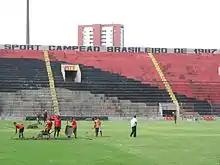

- Avenida Malaquias
The stadium was Opened on 15 May 1918 with a match between America-PE and Flamengo. It belonged to Sport Recife from 1918 until 1937, and had a capacity for 8000 people (2000 being seated).
- Adelmar da Costa Carvalho Stadium (Ilha do Retiro Stadium)
Inaugurated on 4 July 1937, it is the club's current stadium, and it was named after club president Adelmar da Costa Carvalho, but is better known as Iilha do Retiro due to the neighboorhood where it is located. The stadium has a maximum capacity for 30,000 and is located in the neighborhood of Ilha do Retiro in Recife.[11] It was considered the best stadium in Northeast Brazil until the construction of the Arena Pernambuco in 2013, which is currently the best the Northeast because of its structure and FIFA standards.
Training Center
- CT Presidente José de Andrade Médicis (CT do Leão)
The CT Presidente José de Andrade Medici, also known as CT do Leão, is the club's training center for the professional team and all youth levels. located in the city of Paulista, about 30 km from Recife, the site has a total area of 8 hectares (8,000 m2). Currently, the CT faces structural and access problems, mainly on rainy days. The complex underwent major improvements in recent years, to prepare for the 2013 FIFA Confederations Cup and 2014 FIFA World Cup.[12]
The complex has 5 official fields, two hotels, a restaurant, a medical center, a gym, and dressing rooms. The training center was inaugurated on 9 September 2008.[11]
Symbols
Badge
The first coat of arms had nothing to do with the current one. In one of the first statutes of the club the coat of arms was well defined: "On an anchor, bearing the date May 13, 1905 on the arm, supported by a pair of oars crossing a mast containing a croquette, a lifeguard, and in the center a football between a cricket stick and a tennis racket, crossed and surrounded by the letters SCR, with the body containing the phrase 'Sport Club Recife'. Soon, the number 1 badge represented all sports practiced by the club at the time, from cricket to spearfishing.
However, the coat was seen as too complex, difficult to reproduce and did not contain the crimson-black colors. So in 1919 then President Arnaldo Loyo faced a challenge that was considered extremely difficult at the time: get Sport to Belém do Pará to play a series of five friendlies.
The club achieved significant results, since at the time football in Pará was more developed than the Pernambuco one. During the tour, Sport won three games and lost two.
In the game on 3 April 1919, a French bronze trophy called the Lion of the North , which had sculptures including a Greek archer accompanied by an imposing lion, was up for grabs. To the surprise of Pará, Sport won 2–1 and got the trophy. The disappointment from opposing fans was such that a fan invaded the ship where the Crimson-Black club kept the trophy, and damaged its tail with an iron pipe. This incident inspired the development of a new coat of arms for th club, and as a result the lion was adopted as the new symbol of the club because it represented boldness, courage and winning spirit. Designer Armando Vieira dos Santos was responsible for creating it, which was based on Scottish heraldry arms.
The stars present in the current badge are: 2 gold stars, for its two major titles (1987 Brasileirao Serie A and 2008 Copa do Brasil) and 1 silver star, for its minor titles (1990 Brasileirao Série B). The golden stars are larger than the silver one, and are located on the corners, while the silver star is smaller and is located in between the golden stars.
.png.webp) 1905
1905 1919 - Present
1919 - Present
Anthem
The official anthem of the club was created by Eunitônio Edir Pereira.[13]
Mascots
In 1919 in Para, the club won the Lion of the North Trophy. This was a competition which at the time was considered very difficult for any team from Pernambuco, as football in Para was more developed. Sport then went to Belem and won the French bronze trophy, which would later be the reason for creating the mascot, the lion, as well as the creation of one of the club's nicknames: Leão do Norte (Lion of the North).
The mascot is called Leo. It was created over 25 years ago by cartoonist Humberto Araujo, and since then has been illustrating the achievements of the club. Leo is present at all home games, and entertains the crowd at matches. The name Leo means lion in Latin.
Colors & Uniforms
Article 6 of the 2nd chapter says: The official colors of Sport Club do Recife will always be black and red, used together, in uniforms, shields, badges, pennants, flags, etc...
The uniforms of Sport are described in Article 8 of the 2nd chapter: In sports competitions, athletes from Sport Club do Recife will wear an official uniform, which will always have the SCR shield on their shirt, on their left side and at chest level, and obeys one of the following uniforms:
a) Shirt with black and red stripes, with white or black shorts and black socks;
b) White shirt, shorts and socks
c) Black shirt, shorts and socks, with red accents;
d) Golden shirt, shorts and socks, with discreet red and black details;
Kit Manufacturers
 Penalty (1973–74)
Penalty (1973–74) Malharia Terres (1977–80)
Malharia Terres (1977–80) FAIXA (1980)
FAIXA (1980) Adidas (1980–82)
Adidas (1980–82) Le Coq Sportif (1983–87)
Le Coq Sportif (1983–87) Everest (1987)
Everest (1987) MR Artigos Esportivos (1988–89)
MR Artigos Esportivos (1988–89) Topper (1988–92)
Topper (1988–92) Finta (1992–94)
Finta (1992–94) Rhumell (1995–98)
Rhumell (1995–98) Topper (1998–08)
Topper (1998–08) Lotto (2008–2013)
Lotto (2008–2013) Adidas (2014–2017)
Adidas (2014–2017) Under Armour (2018)
Under Armour (2018) Umbro (2019–present)
Umbro (2019–present)
Presidents
This is a list of Sport Recife presidents since 2000:[14]
- Luciano Bivar (1997–2001)[15]
- Fernando Pessoa (2001–02)
- Severino Otavio (Branquinho) (2003–04)[16]
- Luciano Bivar (2005–06)[15]
- Milton Bivar Caldas (2007–08)[17]
- Silvio Alexandre Guimaraes (2009–10)
- Gustavo Dubueux (2011–12)
- Luciano Bivar (2013)[15]
- Joao Humberto Martorelli (2014–16)
- Arnaldo Barros Jr. (2017–18)
- Gustavo Dubueux (2019–present)
Publications about Sport
- Books
- SILVESTRE, Rafael. Copa do Brasil 2008 – Há cinco anos o Brasil era rubro-negro. BB Editora, São Paulo, 2013.
- FILHO, Costa. Meu Coração de Leão – Memórias de um Paraibano Louco pelo Sport. Mídia Gráfica e Editora, João Pessoa, 2013.
- BIVAR, Fernando Caldas. Coração Rubro-negro: "A união faz o Leão". Independente, Recife, 2005.
- CORDEIRO, Carlos Celso e; GUEDES, Luciano. Sport – Retrospecto – 1905 a 1959. Recife, 2005.
- CORDEIRO, Carlos Celso e; GUEDES, Luciano. Sport – Retrospecto – 1960 a 1979. Recife, 2006.
- CORDEIRO, Carlos Celso e; GUEDES, Luciano. Sport – Retrospecto – 1980 a 1999. Recife, 2007.
- SANTOS, Manoel Heleno Rodrigues dos. Memória Rubro-negra (1905–55). M. Inojosa Editora, Recife, 1985.
- SANTOS, Manoel Heleno Rodrigues dos. Memória Rubro-negra II (1956–88). Editora Universitária da UFPE, Recife, 1992.
- SOUZA, Carlos Enrique de. Histórias da Garra Rubro-negra. Editora Comunicarte, Recife, 1993.
References
- ↑ "História do Sport Club do Recife". Campeoesdofutebol.com. 5 July 2008. Retrieved 3 January 2022.
- ↑ MeuSport (8 April 2021). "História do Sport Clube do Recife – MeuSport" (in Brazilian Portuguese). Retrieved 4 January 2022.
- ↑ "Sport Recife awarded Brazilian title... 30 years after the event". AS.com. 19 April 2017.
- ↑ "Court names Sport Recife as 1987 Brazil title winner over Flamengo". espn.com. 19 April 2017.
- ↑ "Copa Sudamericana: Sport Recife golea al Bahía 4-1 y se clasifica". CONMEBOL.com (in European Spanish). 27 August 2015.
- ↑ "Copa Sudamericana: Bahía vence 1-0 a Sport en fase brasileña". CONMEBOL.com (in European Spanish). 20 August 2015.
- ↑ "Profissional" [First team] (in Brazilian Portuguese). Sport Club do Recife. Retrieved 27 March 2021.
- ↑ Buzato, Juliano (24 September 2013). "Top 5 maiores artilheiros do Sport". Mantos do Futebol (in Brazilian Portuguese). Retrieved 7 January 2022.
- ↑ "Nova pesquisa de torcidas mostra Vasco à frente do Palmeiras". globoesporte.com. 26 March 2013. Retrieved 7 January 2022.
- ↑ FIFA.com (27 May 2020). "The grand old foes of Recife". www.fifa.com. Retrieved 27 May 2020.
- 1 2 "Our homes". Sport Recife. Retrieved 7 January 2022.
- ↑ "CT do Sport completa 10 anos, com R$ 21 mi em obras e 3 vendas milionárias". Cassiozirpoli.com. 9 September 2018.
- ↑ "HINO - Sport Club do Recife" (in Brazilian Portuguese). 14 March 2019. Retrieved 9 November 2023.
- ↑ "Lista de ex-presidentes do Leao". Sportrecife.com (in Portuguese). Retrieved 7 January 2022.
- 1 2 3 "Bivar se afasta do comando do Sport para ser candidato a deputado federal". globo esporte (in Portuguese). 12 December 2013.
- ↑ "Former Sport presidents support Branquinho". meusport.com (in Portuguese). 23 July 2004.
- ↑ "Nome de Milton Bivar agita eleição do Sport" (in Portuguese). superesportes.com. 14 December 2012.